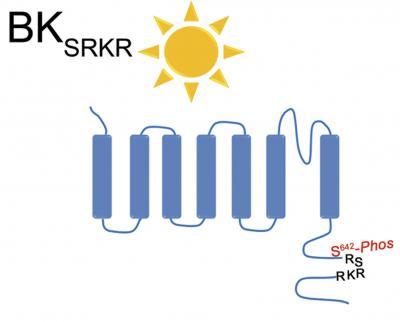In the modern world of long-distance travel, many people have experienced circadian-rhythm disruption, especially after traveling across time zones.
The physiology that affects modulating our biological "clocks" to combat jet lag or cope with alternating shifts is complex. A new paper in The Journal of General Physiology says BK ("Big Potassium") channels, which are activated during nerve impulses and can reduce neuronal excitability, affect a variety of physiological functions
and that helps explain some of the biophysical processes underlying regulation of circadian rhythms.
One of the channel's most intriguing roles is to regulate the frequency of nerve impulses conducted by the SCN, a structure located in the brain that acts as a master clock to synchronize circadian rhythms throughout the body. During the nighttime, SCN neurons are less active than during the day, consistent with the increase in SCN BK channel abundance that occurs at night. During the day, however, BK channels have little effect on neuron excitability in the SCN, even though one might expect the increase in neuronal firing rate to increase BK activation.
In a new study, Andrea Meredith and colleagues from the University of Maryland School of Medicine show that, in addition to the reduction in overall number of BK channels present in the SCN during the day, decreased channel activity might also depend on an increase in the prevalence of a channel variant containing a four-amino acid chain (SRKR). The researchers demonstrated that stimuli comparable to spontaneous daytime firing elicited a diminished response from the SRKR variant compared with a different BK variant.

A study in The Journal of General Physiology shows how changes in BK channel expression pattern might affect circadian rhythms. BK channels with a SRKR splice variant had reduced impact on neurons during the day. Credit: Shelley et al., 2013
The findings provide new evidence about how BK channels modulate SCN activity, solving one more piece of the puzzle of complexities surrounding circadian rhythm regulation.